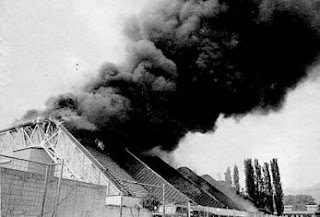The aerial view (picture: www.tahoebest.com) makes it perfectly clear what these Games where about: They were the most compact ever, both Summer and Winter. It took visitor's only a few footsteps from Blyth Arena to the speed skating rink, the bottom of the ski jump created by German expert Heini Klopfer and the finish line for the alpine ski events. The only events that took place away from the centre were the cross country ski races at McKinney Creek. The bobsleigh events had been cancelled before mainly due to the high costs.
1960 also marked the birth of an idea often copied later: a business effort to develop a ski ressort by landing the Olympic Games. New York lawyer Alexander Cushing had the genius to promote the by this time almost unknown ski resort in the Sierra Nevada mountains - and it worked. Squaw Valley was the first place on earth to be put on the global map only by hosting Olympic Games.
This film gives a nice overview of the Games:
Squaw Valley also marked the first time that television covered the Games on a wider scale. A few hours of footage has survived in the CBS archives.
The most stunning result of Squaw Valley was probably the triumph of German nordic combined athlete Georg Thoma, the first man from outside scandinavia to win the marquee event of nordic skiing. 34 years later, his nephew Dieter Thoma was part of the Gold medal winning German ski jumping team at the Lillehammer Games. By that time Germany (both East and West) already had developed a big tradition in the combined events.
Also a place in th history books gained the United States hockey team. 20 years prior to the miracle of Lake Placid, the crew stunned the Soviets 3-2 and took the Gold medal. The last player to have been cut from the team before Squaw Valley was Herb Brooks - the coach who later made the miracle of Lake Placid come true. A documentary about the 1960 team was published in 2009 with the fitting title "Forgotten Miracle":







